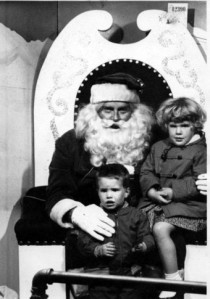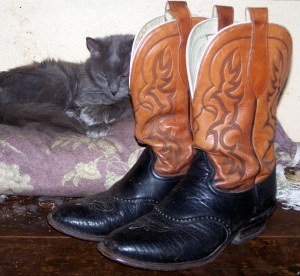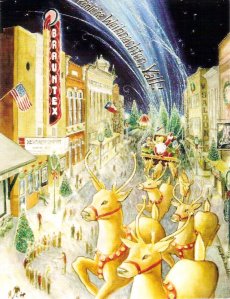No, I can’t say I appreciate modern contemporary art all that much, even though I worked for a while in places that were stuffed full of it. Most of it leaves me … ummm, completely under-whelmed. Especially a three panel job in the hallway at the public radio station where I used to part-time, which looked like the worlds’ most incompetent dry-wall specialist had been allowed to cut loose with a 5-gallon bucket of auto-body filler and a dozen spray cans of silver paint.
Mind you, it was an interesting effect, and it would be very striking as a wall-covering; say, large panels of it interspersed with dark, stark modern Neo-Classical columns, and a plain ceiling and dark marble floor. As a wall-treatment, it might be quite impressive, in such a room as that, but as three large unframed canvasses covered in Bondo and silver paint, hanging in a corridor, it lacked a certain something. Like appeal, to someone who didn’t have to pretend to see a deep meaning in it. The station had a benefit auction of donated objects d’art, a good few years ago, and the part-time staff speculated viciously that the place was eventually decorated with the works that didn’t sell and that the artist refused to take back.
My parents had one of those framed oil modernistic things on the dining room wall, for years and years, mostly because it was done in very nice shades of blue (which matched Mom’s decor of the time) and a good friend had given it to them … no, not the artist. It was a bit of set property — the friend worked for one of the Hollywood studios, where very often the inexpensive bits of props and set-dressing items were given away to the crews, rather than take up expensive storage space. We were inexpressibly thrilled sometime in the late 1960ies to have spotted this picture, on a repeat of an absolutely ancient Perry Mason show – on the wall of the studio of an artist, supposedly the corpse du jour. It was actually a horrible pastiche, of a moonlight ocean, and some shoreline rocks and pier, with half of it being vaguely Impressionist, and half irresolutely Cubist. Cruelly, Mom and Dad used it to gage the artistic judgment and flattery-administering capabilities of anyone who remarked on it. Anyone lavishing compliments was instantly condemned — married couples have such a way of exchanging knowing glances. Another person, who would become a very dear friend, earned credit immeasurable from Mom and Dad, for finally asking if he couldn’t sit on the other side of the dining room table, just so he wouldn’t have to look at the horrible thing.
No, modern art doesn’t grab me at all, and if it tried, I’d slap it’s face and prefer charges of ungentlemanly behavior. The stuff that gets written up, and displayed everywhere just looks more and more like an over-the-top joke. It’s as if they are trying to top each other, on what they can get the so-called aficionados to swallow and come back for more, and somehow missing the whole point of art. That is, it should fill up a blank space of wall, intrigue or interest your friends and neighbors, and be something that you yourself can stand to look at every morning for a couple of decades. Or even, look at every morning for a couple of decades with a hangover. (Or make your dinner guests look at it, over the course of a fine meal.) Bonus, if the colors in it match something else in the room. Oh, and if possible, it should be something that appeals to you, and to you personally. Frankly, the average Jackson Pollock makes me think of nothing so much as the unspeakably disgusting sidewalks underneath trees where grackles have been roosting.
Say, that’s an idea!! I could get a grant from the NEA, and park huge canvases under the trees, and feed the flock something different every night that would turn their poop different colors! At the end of the week – it wouldn’t be enormous canvases covered with multicolored grackle poop, it would be Art with a capital ‘A’! Hey, if half a cow in formaldehyde can wow the art world, this has a better than even chance, especially if I can wrap it in layers and layers of vaguely progressive explanations, and slip in a couple of stiletto-slices at the bourgeoisie.
It was to giggle at, though, that the bourgeoisie — that part of it that had money to spend on art that they liked and were past being dragooned into subsidizing something that they really don’t care for at all were purchasing Thomas Kinkade The Painter – of Light.
I don’t know if acres of cozy ginger-bready cottages sagging under the weight of sun-set colored icing are much of an artistic improvement over half a dead cow, or a an acre of multicolored paint splatters, but it must be easier to contemplate over a meal, unless you are diabetic. And at least, Kinkade made a bundle selling what people actually, you know, really wanted – not begging for grants and sucking up to people with more money than confidence in their own taste, just to stick us all with something that we didn’t care care for. I predicted several years ago that he would turn out to be this era’s version of a Rogers’ group; enormously popular, then drop out of fashion as something embarrassing and old-fashioned (you’ll be able to buy prints at yard sales for nickels) and then there will be a revival of interest in about 100 years.
With luck, original Kinkade’s will last longer than grackle poop, and cows in formaldehyde.




Recent Comments